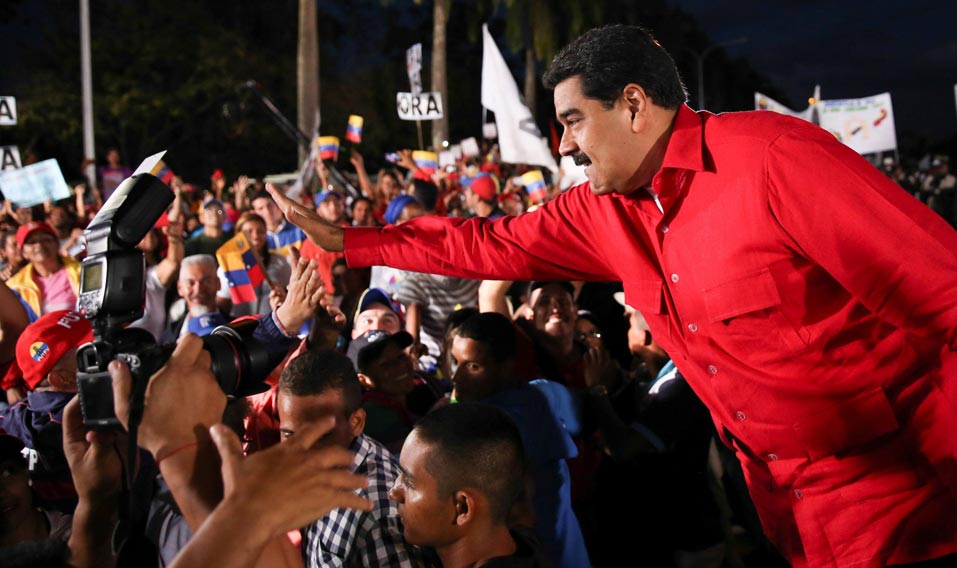Taking a cue from India's demonetisation strategy, Venezuela has withdrawn its highest legal tender 'to beat mafia'. President Nicolas Maduro ordered airports, seaports and all land entrees to the country closed so that cash carried overseas misses the 72-hour schedule of demonetisation.
"In accordance with my constitutional powers and through this emergency economic decree, I have decided to take the 100 bolivar bill out of circulation in the next 72 hours," said Maduro on TV programme 'Contact with Maduro', aired on Sunday. The government believes that Bs100 bills worth billions of bolivars might not come back. The government's short-hours scheme is intended to prevent gangs operating in Colombia along Venezuela’s border from returning their hoarded currency.
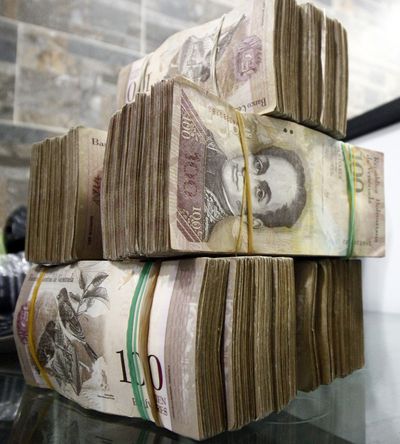 View of 100-bolivar-bills at a bureau de change in La Parada, municipality of Villa del Rosario, Norte de Santander department, Colombia, in the border with Venezuela, on December 11, 2016. Photo: AFP
View of 100-bolivar-bills at a bureau de change in La Parada, municipality of Villa del Rosario, Norte de Santander department, Colombia, in the border with Venezuela, on December 11, 2016. Photo: AFP
In an hour-long speech Maduro said the move had become necessary after official investigations proved that Colombia-based mafias had stashed away currencies abroad with helps from national banks.
The Central Bank of Venezuela has taken measures to issue six larger currencies of values 500, 1,000, 2,000, 5,000, 10,000 and 20,000 bolivars to ease out currency transactions. At present, the purchasing power of bolivars is so low that people are constrained to carry wads of cash even for buying small things. Card payments have become increasingly popular owing to the troubles of carrying bundles of currencies.
Demonetisation of 500 and 1000 rupee notes in India has affected daily life and trade because of severe cash crunch. Venezuela's opposition parties have raised concern that there might not be sufficient currencies to replace the demonetised 100-bolivar bills valued half of all the bills and coins in use. However, the problem with Venezuela is that its fundamentals are too bad for repair.
Too much, too little, too late
The financial crisis began with an oil strike in 2003 when former President Hugo Chavez introduced tight monetary measures to halt currency outflow. The exchange rate at that time was comfortable—1.6 bolivars for a US dollar. At the current market rate, the 100 bolivars are worth just 2 US cents.
Hyperinflation has made life extremely difficult in Venezuela. The International Monetary Fund (IMF) has projected Venezuela's inflation rate to touch 475 per cent by the end of this year. IMF data shows that Venezuela is doing badly on all fronts—its growth rate is at -8 per cent and the unemployment rate is 17 per cent and is heading to double soon.
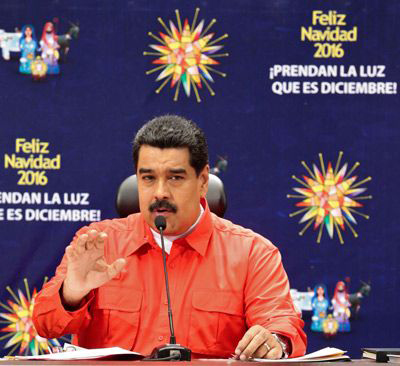 Venezuelan President Nicolas Maduro speaking during his TV program "Contacto con Maduro" (Contact with Maduro) in Caracas on December 11, 2016. Photo: AFP
Venezuelan President Nicolas Maduro speaking during his TV program "Contacto con Maduro" (Contact with Maduro) in Caracas on December 11, 2016. Photo: AFP
Once counted among the most prosperous nations in the world, the South American country is now passing through its worst financial crisis thanks to the currency mismanagement by its government. In addition to that, low crude prices, political instability and debt repayment have contributed to its economic woes. However, Caracas has put the entire blame as “foreign aggression against our country.”
Venezuela's economy is hugely dependent on crude export for importing most of its necessities. When the international oil market tanked in 2014, it caused a shortage of foreign currency—around 40 per cent fall in export revenue. Nicolas Maduro, who succeeded Hugo Chavez in 2013, found an easy solution to the problem of currency shortfall: print more money. Immediately, the prices of all goods, including foodstuffs, medicine shot up. The more bolivar lost it value, the more currency the government printed. It also raised wages to appease the working class.
Now the country is on food rationing—it is transported under high security cover for fear of riots. While the government rations things at a low price, the black market inflation raises the price of imported items. There is shortage of all essentials, including electricity. The government functioning has been affected and economy may collapse anytime.
With more cash in circulation, bolivar has lost much of its value and the currency exchange system is in a state of chaos. Having lost confidence in bolivar, people look towards dollar as a secure currency.
Dollar dilemma
Foreign goods are too costly in Venezuela, but the country can’t do without it. According to the latest released data, in 2011, Venezuela imported 24 per cent of its food requirement. People need dollar to buy imported everyday goods as they are sold in dollar rates only. Dollars got from oil trade are given away to people at the official exchange rate. Venezuelan government pays and gets ten bolivars for a dollar.
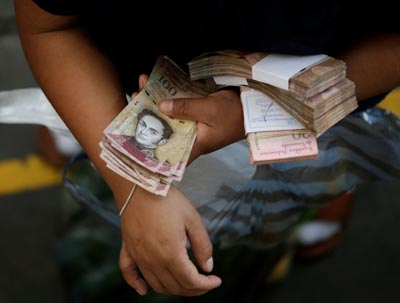 A customer counts Venezuelan bolivar notes at a market in downtown Caracas, Venezuela, December 7, 2016. Photo: Reuters
A customer counts Venezuelan bolivar notes at a market in downtown Caracas, Venezuela, December 7, 2016. Photo: Reuters
The situation is so bad that Venezuela does not have money to settle its bill for the currency printed at De La Rue, the world's largest banknote manufacturer. To overcome currency shortfall, the central bank ordered more banknotes. Orders were placed for printing 2.6 billion banknotes at the UK's De La Rue, France's Oberthur Fiduciaire and Germany's Giesecke & Devrient. Before they were delivered, the order was raised to 10.2 billion notes.
Brutal reality
Financial experts have recommended unification of the currency exchange rates into one floating rate for all, including the government. But why is the government not agreeing to this advice?
There is a fear that devaluation would lead to even greater inflation. Experts disagree. They say that unifying the exchange rates according to the market will automatically wind up all the black market exchanges. Inflation is at its peak now and the economy has almost collapsed. Closing down the black market is the primary step towards saving the country.
The Venezuelan government does not want an unpopular devaluation of currency as it would affect prices at state-owned shops—they sell food and essential items at highly subsidised prices to the poor. However, people are made to stand in line for hours. Subsidised goods at these shops often disappear for sale in the black market. Opposition parties allege that Maduro’s Unified Socialist Party of Venezuela is handling the distribution networks through its local units.
The country has the dubious distinction of being one of the worst corrupt nations. People in authority and those connected to them can get more dollars from government at official rate which they get exchanged at blackmarket rates. Making any change in the present system will face tough opposition from top bureaucrats, military officials and politicians who amass huge wealth from the multiple exchange rate system.
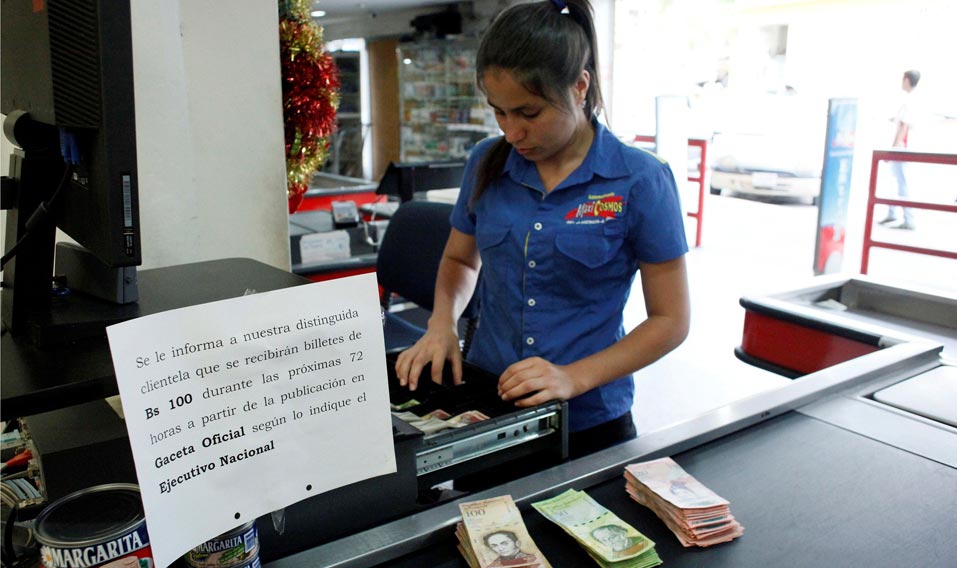 A cashier counts Venezuelan bolivar notes at a supermarket in San Cristobal, Venezuela, December 12, 2016. The placard reads: "We inform our distinguished clientele that 100 bolivar notes will be received during the next 72 hours from the date of publication in the Official Gazette as indicated by the National Executive". Photo: Reuters
A cashier counts Venezuelan bolivar notes at a supermarket in San Cristobal, Venezuela, December 12, 2016. The placard reads: "We inform our distinguished clientele that 100 bolivar notes will be received during the next 72 hours from the date of publication in the Official Gazette as indicated by the National Executive". Photo: Reuters


